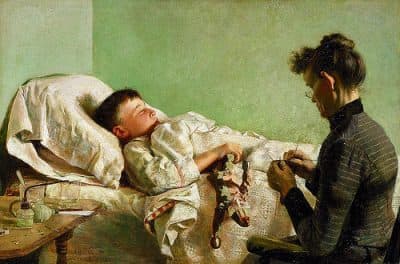Advertisement
Against Antibiotic Overuse

I'll admit it, at least twice this winter I've begged my pediatrician for antibiotics for my kids, who may — or may not — have had bacterial infections. And I know I'm not alone.
But in this opinion piece, written by John Auerbach, the Massachusetts Public Health Commissioner and Dr. Alice Tolbert Coombs, president of the Massachusetts Medical Society, it's clear that resistance to antibiotics will continue to rise unless we all start using antibiotics only when they can truly be effective:
Antibiotics: When to Use Them (and When Not To)
Right now as you are reading this, in at least one clinic in Massachusetts a patient is sitting in a doctor’s office. The patient has been up all night with the symptoms of a bad cold - cough, running nose and exhaustion. The patient can’t afford to miss work and is desperate for a good night’s sleep. The doctor has explained that there is no prescription medicine that will help but the patient pleads: “Please, doctor, just give me a prescription for antibiotics. They always work for me. What’s the big deal?” Well, it turns out it is a big deal.
The use of antibiotics against infections is one of the great success stories in the past century of medicine. Prescribed and used effectively, antibiotics have saved countless lives and reduced pain and suffering in patients around the world. In recent years though, we have begun seeing troubling indications that antibiotics are losing their effectiveness. It’s up to all of us together to understand why this has happened, and what we can do to reverse the trend.
Antibiotics are designed to fight infections caused by bacteria, such as strep throat and pneumonia. The first antibiotic developed by scientists was penicillin, in the 1940s. Since then, antibiotics have revolutionized medical care and dramatically reduced illnesses and deaths caused by infectious diseases.
Now, however, we have begun to see a rise in types of bacteria that are resistant to what had been considered very powerful antibiotics. Why is that? Every time that an antibiotic is used against a population of bacteria, the weaker and more sensitive strains of bacteria are killed. But the stronger strains of bacteria live to fight another day. What’s more, they multiply. So, the more that we use antibiotics, the more we contribute to the development of antibiotic-resistant bacteria.
That’s why it’s so important that we only use antibiotics when they’re necessary. Each of us has a role to play in this vital effort:
Patients can learn when and how to take them: Antibiotics are only for use against bacterial infections – they don’t work against viral infections such as the common cold or most bronchitis. When your doctor has prescribed antibiotics, you should take them exactly as directed, and for as long as what’s listed on the prescription. When you stop taking antibiotics before you’re supposed to, you can cause any remaining bacteria to multiply and grow into more resistant strains.
Partnerships at the local, state and federal level can help: The Massachusetts Department of Public Health and the Massachusetts Medical Society, working together with the Massachusetts Association of Health Plans, Partnership for Health Care Excellence. The Massachusetts Hospital Association, and Blue Cross/Blue Shield of Massachusetts, are launching an informational campaign to highlight the importance of appropriate use of antibiotics among the public. Meanwhile, the Centers for Disease Control and Prevention (CDC) now features a similar nationwide campaign called “Get Smart: Know When Antibiotics Work”.
Working together, we can ensure that antibiotics continue to be an effective tool in saving lives and reducing illness in our families and our communities now and for years to come.
This program aired on March 3, 2011. The audio for this program is not available.
